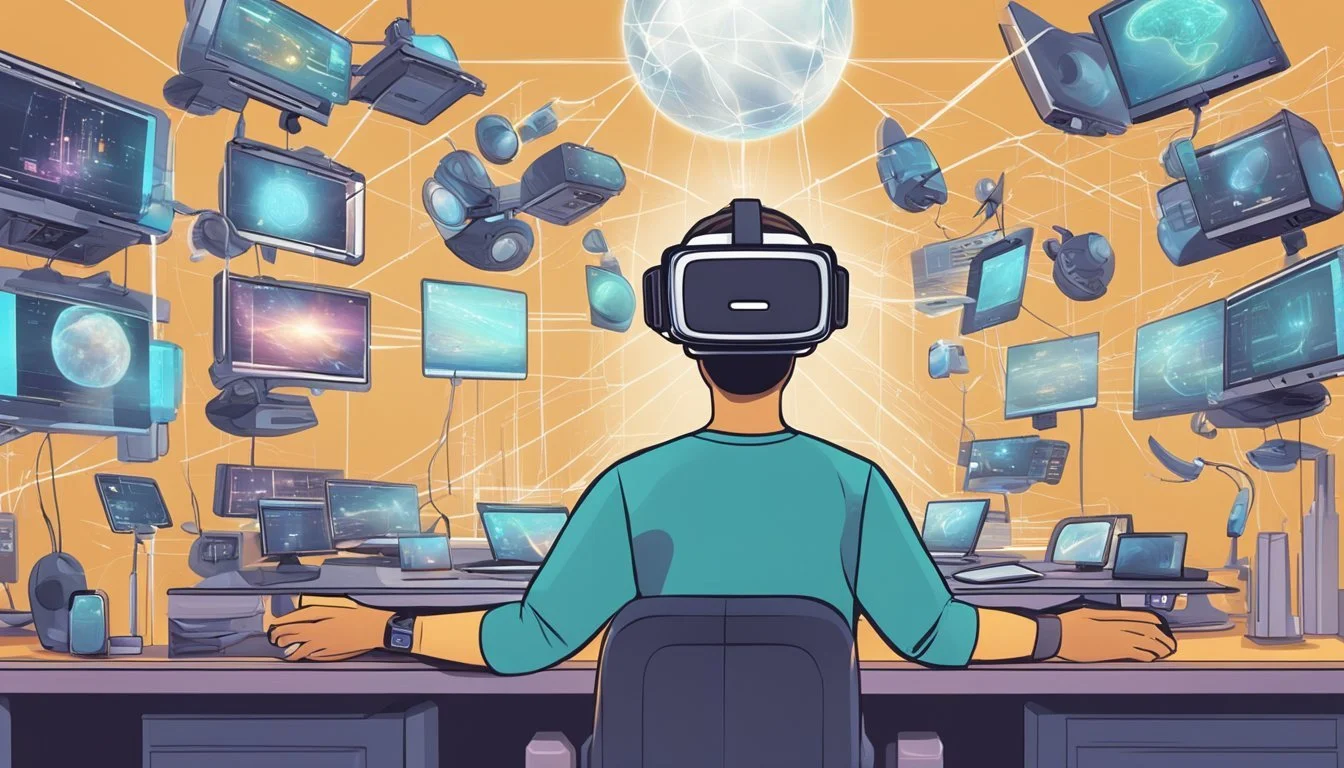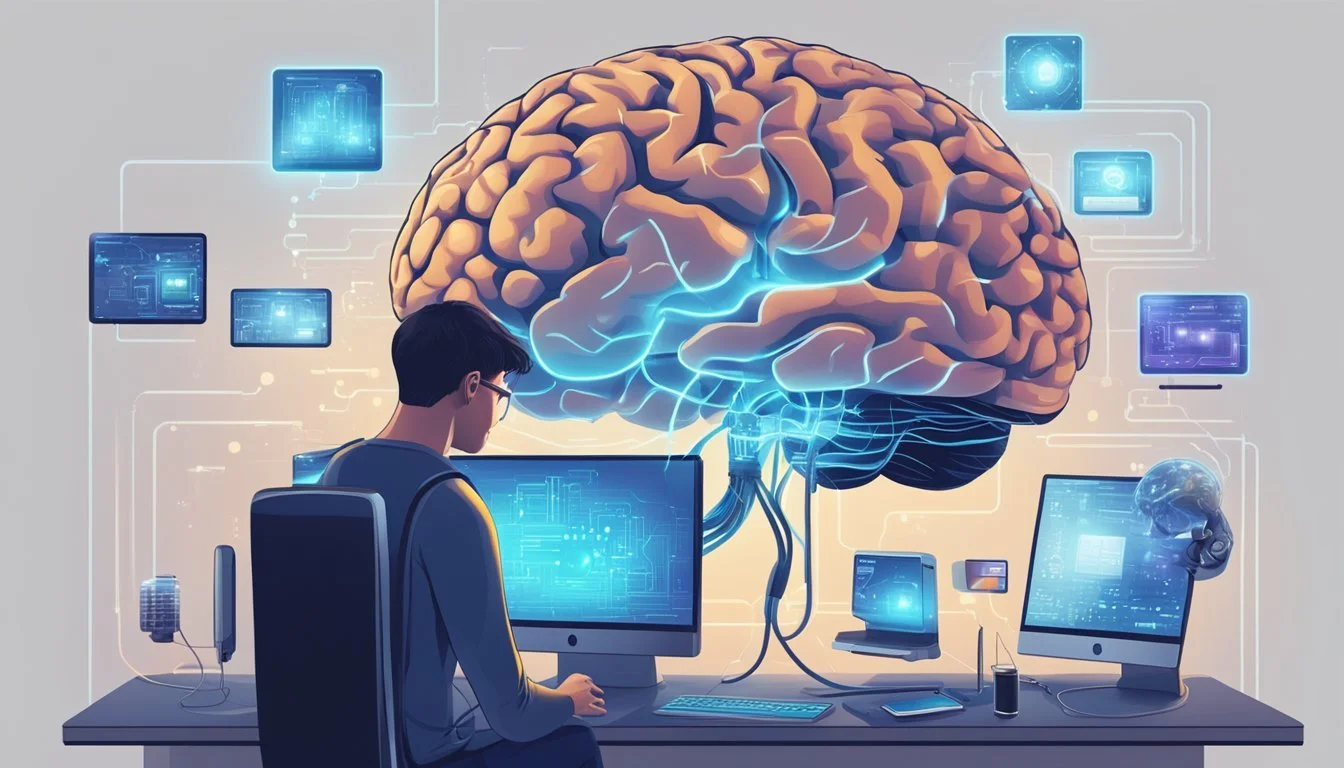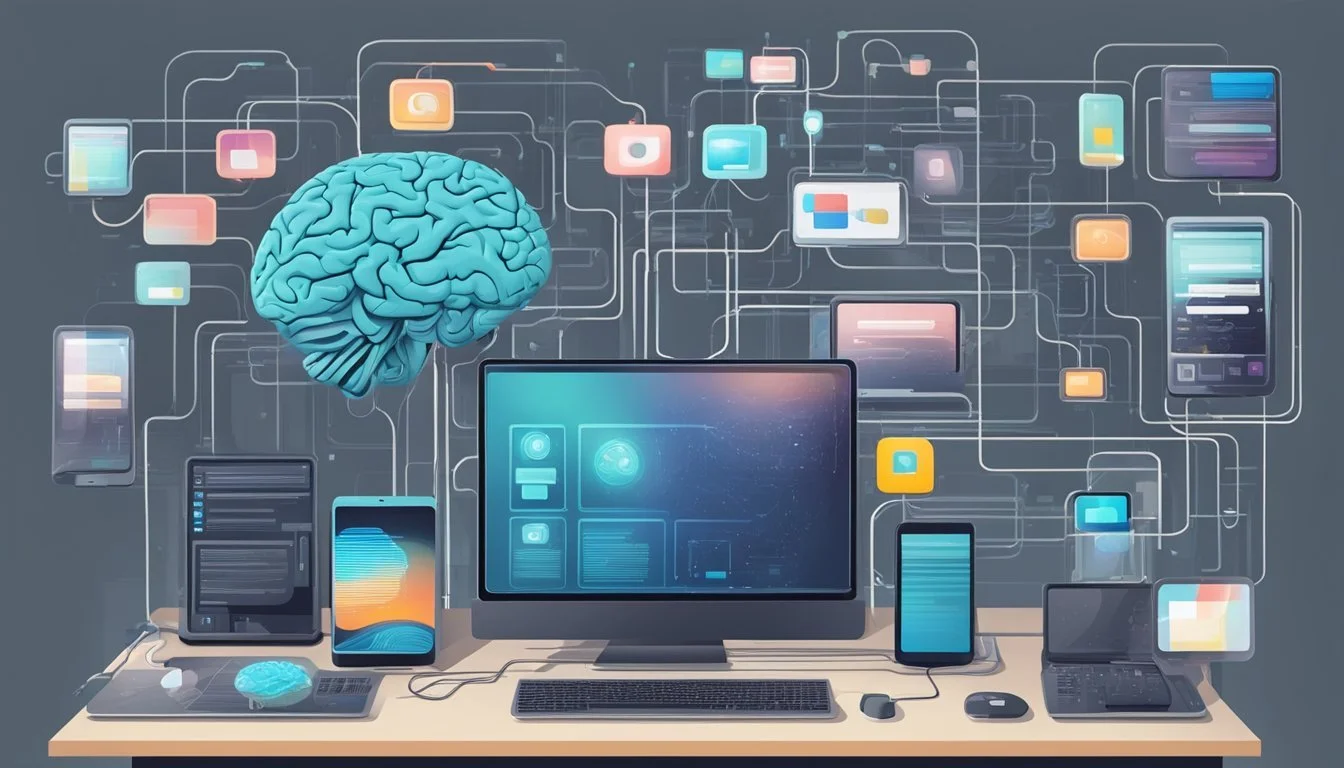12 Documentaries That Show How Technology Is Changing Our Brains
A Mind-Altering Journey Through Digital Evolution
Technology is rapidly transforming our world, and its impact on the human brain is a subject of growing fascination. Documentaries exploring this intersection of neuroscience and technology offer viewers intriguing insights into how our cognitive processes are evolving in the digital age. These films delve into topics like neuroplasticity, artificial intelligence, and the effects of constant connectivity on our thinking patterns.
Documentaries about technology's influence on the brain provide a window into cutting-edge research and real-world implications. They showcase expert perspectives from neuroscientists, psychologists, and tech innovators while examining both the potential benefits and risks of our increasingly digital lives. By highlighting personal stories alongside scientific findings, these documentaries make complex concepts accessible to a wide audience and spark important conversations about the future of human cognition in a tech-driven world.
1) The Social Dilemma
"The Social Dilemma" is a thought-provoking documentary that explores the impact of social media on society. Released in 2020, the film combines interviews with tech industry insiders and dramatic reenactments to illustrate its points.
The documentary features former employees from major tech companies who share insider knowledge about how social media platforms are designed to capture and maintain user attention. It highlights the addictive nature of these platforms and their potential negative effects on mental health.
One of the key themes in "The Social Dilemma" is the manipulation of user behavior through algorithms and data collection. The film argues that social media companies exploit human psychology to keep users engaged and generate profits.
The documentary also explores the societal implications of social media, including its influence on politics, mental health, and interpersonal relationships. It raises concerns about the spread of misinformation and the polarization of public discourse.
"The Social Dilemma" has garnered significant attention since its release, with an estimated 100 million views worldwide. It has won multiple awards, including two Emmy Awards, and sparked discussions about the need for greater regulation of tech companies.
2) Lo and Behold: Reveries of the Connected World
Werner Herzog's 2016 documentary explores the profound impact of the Internet and digital technologies on modern society. The film features interviews with various tech pioneers and experts, offering insights into the origins and evolution of our connected world.
Herzog examines both the potential and perils of technological advancements. He delves into topics such as artificial intelligence, robotics, and the Internet of Things, presenting a nuanced view of their effects on human life.
The documentary begins at UCLA, where computer scientist Leonard Kleinrock demonstrates the first Internet node. From there, it journeys through different aspects of our digital landscape, touching on issues like cybersecurity, online addiction, and the future of AI.
Herzog's signature style blends factual information with philosophical musings, creating a thought-provoking exploration of our increasingly interconnected existence. The film encourages viewers to consider the implications of living in a world where digital technologies are omnipresent.
Lo and Behold, Reveries of the Connected World - IMDb
3) Connected: The Hidden Science of Everything
Connected: The Hidden Science of Everything is a 2020 documentary series hosted by science journalist Latif Nasser. The show explores unexpected connections between seemingly unrelated topics.
Each episode focuses on a different subject, such as surveillance, clouds, or excrement. Nasser travels the world to interview experts and showcase fascinating scientific discoveries.
The series aims to reveal the intricate ways humans are linked to each other and the universe. It combines elements of science, technology, and human interest stories.
Nasser's enthusiastic presentation style and the show's quirky tone make complex scientific concepts accessible to a general audience. The series encourages viewers to see the world in new ways.
Connected demonstrates how advancements in technology and scientific understanding are revealing previously hidden relationships in our world. It highlights the interconnectedness of all things.
4) The Great Hack
The Great Hack explores the Facebook-Cambridge Analytica data scandal that rocked the 2016 U.S. presidential election. Directed by Karim Amer and Jehane Noujaim, this Netflix documentary delves into the world of data exploitation and privacy concerns in the digital age.
The film follows key players involved in the scandal, including Brittany Kaiser, a former Cambridge Analytica employee turned whistleblower. It examines how personal data was harvested from millions of Facebook users without their knowledge or consent.
The Great Hack sheds light on the power of targeted advertising and psychological profiling in influencing voter behavior. It raises important questions about data privacy, digital manipulation, and the ethics of social media platforms.
Through interviews and archival footage, the documentary paints a chilling picture of how technology can be used to sway public opinion and potentially undermine democratic processes. It serves as a wake-up call for viewers to consider the implications of their digital footprint.
The film's relevance extends beyond politics, highlighting the broader impact of data mining on society and individual autonomy in the information age.
[https://en.wikipedia.org/wiki/The_Great_Hack]
5) Terms and Conditions May Apply
"Terms and Conditions May Apply" explores the hidden implications of online privacy agreements. Directed by Cullen Hoback in 2013, this documentary sheds light on the data collection practices of major tech companies.
The film features interviews with influential figures like Mark Zuckerberg and Eric Schmidt. It reveals how user information is gathered and utilized through various online platforms and services.
Hoback's documentary examines the often-overlooked fine print in user agreements. It highlights the extent of personal data that companies can access and use when users accept these terms.
The film raises important questions about digital privacy and data ownership. It encourages viewers to consider the true cost of "free" online services and the value of personal information in the digital age.
"Terms and Conditions May Apply" serves as a wake-up call about the potential risks of sharing information online. It prompts audiences to think critically about their digital footprint and online behavior.
Wikipedia: Terms and Conditions May Apply
6) Downloaded
"Downloaded" explores the rise and fall of Napster, the pioneering peer-to-peer file-sharing service. Directed by Alex Winter, the documentary chronicles how Napster revolutionized music distribution and consumption in the late 1990s.
The film examines Napster's impact on the music industry and consumer behavior. It features interviews with key figures, including co-founders Shawn Fanning and Sean Parker, as well as musicians and industry executives.
"Downloaded" highlights how Napster's technology changed the way people accessed and shared music. It also delves into the legal battles that ultimately led to the service's demise.
The documentary showcases how Napster paved the way for digital music platforms and streaming services we use today. It offers insights into the ongoing debate about intellectual property rights in the digital age.
7) iHuman
iHuman explores the rapidly evolving world of artificial intelligence and its impact on society. The documentary features interviews with leading AI experts and industry pioneers, offering insights into the development and implementation of this technology.
The film delves into the potential benefits and risks associated with AI, examining how it is reshaping various aspects of our lives. It raises important questions about privacy, social control, and the future of human-machine interactions.
Through its in-depth exploration, iHuman provides viewers with a thought-provoking look at the AI revolution. The documentary emphasizes the far-reaching implications of this technology on our future and encourages critical thinking about its role in shaping society.
iHuman serves as an eye-opening examination of the intersection between technology, ethics, and social responsibility. It presents a balanced view of AI's potential to transform industries while also addressing concerns about its impact on human autonomy and decision-making.
8) We Live in Public
"We Live in Public" is a thought-provoking documentary that explores the impact of technology on privacy and human behavior. Directed by Ondi Timoner, the film follows internet entrepreneur Josh Harris and his controversial social experiment.
Harris created a bunker-like space in New York City where 100 people lived together under constant surveillance. Cameras recorded their every move, streaming the footage online for viewers to watch.
The experiment aimed to simulate a future where privacy no longer exists. Participants willingly surrendered their personal space and autonomy, living in transparent pods and sharing communal facilities.
As the project progressed, it revealed the psychological effects of constant observation. Some participants thrived on the attention, while others experienced emotional breakdowns.
The documentary raises important questions about the role of technology in our lives and the value of privacy in the digital age. It serves as a cautionary tale about the potential consequences of oversharing online.
"We Live in Public" won the Grand Jury Prize at the 2009 Sundance Film Festival. The film's themes remain relevant today as social media and surveillance technology continue to shape our society.
9) Screened Out
"Screened Out" is a documentary that explores the pervasive influence of digital technology on our daily lives. Directed by Jon Hyatt, the film delves into the world of screen addiction and its impact on individuals and society.
The documentary presents startling statistics about our digital habits. Adults spend 4 to 7 hours a day on non-work related online activities, with 80% of this time on mobile devices.
"Screened Out" highlights the role of dopamine in screen addiction. The film examines how social media platforms and mobile apps are designed to trigger dopamine releases, creating a cycle of dependency.
The documentary also addresses the effects of excessive screen time on children's developing brains. It emphasizes the importance of early years in cognitive and social skill development.
Through interviews and case studies, "Screened Out" illustrates the real-world consequences of screen addiction. One poignant example involves a teenage girl who contemplated suicide due to social media-induced unhappiness.
https://www.imdb.com/title/tt11392780/
10) Digital Disconnect
"Digital Disconnect" explores the growing rift between our digital lives and real-world interactions. This documentary examines how constant connectivity affects our relationships, mental health, and social skills.
The film features interviews with psychologists, sociologists, and tech experts who discuss the impact of smartphones and social media on human behavior. It delves into the addictive nature of digital platforms and their effects on attention spans and cognitive functions.
"Digital Disconnect" highlights the paradox of feeling more isolated despite being more connected than ever. It showcases studies demonstrating decreased empathy and face-to-face communication skills among heavy tech users.
The documentary also addresses the phenomenon of "digital detox" and its potential benefits. It presents strategies for maintaining a healthy balance between online and offline experiences in the modern world.
[https://www.imdb.com/title/tt8390128/]
11) In the Age of AI
"In the Age of AI" is a thought-provoking documentary produced by FRONTLINE that explores the profound impact of artificial intelligence on modern society. The film delves into how AI is reshaping various aspects of our lives, from employment to privacy.
The documentary examines the growing rivalry between the United States and China in the field of AI development. It highlights the potential consequences of this technological arms race on global power dynamics and economic structures.
Experts featured in the film discuss the transformative effects of AI on job markets and industries. They explore both the opportunities and challenges presented by automation and machine learning technologies.
"In the Age of AI" also addresses concerns about data privacy and surveillance in an increasingly connected world. The documentary raises important questions about the ethical implications of AI adoption and its potential to reshape human society.
12) Data Science Pioneers
Data Science Pioneers offers an insightful look into the world of data science and its growing impact on society. The documentary features interviews with leading data scientists from Europe and North America.
These experts share their perspectives on the field's evolution and its future potential. They discuss their passion for data science and the exciting challenges they face in their work.
The film explores ethical considerations surrounding data science and artificial intelligence. It examines how these technologies are reshaping various industries and our daily lives.
Data Science Pioneers provides a balanced view of the opportunities and risks associated with big data and machine learning. It highlights the importance of responsible innovation in this rapidly advancing field.
Viewers gain a deeper understanding of data science's role in driving technological progress and solving complex problems. The documentary serves as an informative introduction for those curious about this influential discipline.
[https://www.imdb.com/title/tt10451018/]
The Impact of Technology on Brain Functionality
Digital technology is reshaping how our brains function and process information. Research indicates that frequent internet use may alter neural pathways and cognitive processes.
One key change is in attention span and focus. The constant stream of notifications and information can lead to more scattered thinking and difficulty concentrating for extended periods.
Memory formation is also affected. With instant access to information, the brain may rely less on storing facts and more on remembering where to find them online.
Multitasking capabilities appear to improve with regular tech use. However, this comes at the cost of reduced depth of engagement on individual tasks.
Brain plasticity allows for adaptation to new technologies. Areas involved in visual processing and hand-eye coordination may become enhanced in frequent device users.
Some studies suggest decreased activity in regions associated with empathy and emotional processing due to reduced face-to-face interactions.
Critical thinking skills can suffer from quick access to answers, potentially reducing analytical problem-solving abilities.
Sleep patterns are often disrupted by blue light exposure from screens, impacting overall cognitive function and memory consolidation.
While technology offers cognitive benefits, it's crucial to balance screen time with real-world experiences for optimal brain development and functionality.
Neuroplasticity and Digital Devices
The human brain demonstrates remarkable adaptability in response to digital technologies. This neuroplasticity allows for both positive and negative changes in cognitive function and behavior as we interact with screens and devices.
Adapting to New Learning Platforms
Digital platforms offer novel ways to acquire knowledge and skills. Online courses, educational apps, and interactive media engage multiple senses, potentially enhancing retention and understanding. Studies show that video games can improve spatial awareness, problem-solving abilities, and hand-eye coordination.
Brain imaging reveals increased activity in regions associated with learning when using digital tools effectively. However, the brain may also adapt to expect constant stimulation and rapid feedback, potentially impacting attention spans during slower-paced activities.
Educators are leveraging these insights to design more effective digital learning experiences. Adaptive algorithms tailor content to individual learners, optimizing the brain's ability to process and retain new information.
Digital Addiction and Cognitive Changes
Excessive screen time can lead to addiction-like behaviors and neural changes. Social media and mobile apps often employ persuasive design techniques that trigger dopamine release, reinforcing usage patterns.
Brain scans of heavy digital users show alterations in gray matter density and white matter integrity. These changes are associated with decreased attention, impulse control, and emotional processing.
Multitasking with digital devices may reduce cognitive capacity and increase stress levels. The brain struggles to deeply focus when constantly switching between tasks or responding to notifications.
Strategies to mitigate negative effects include digital detoxes, mindfulness practices, and setting boundaries on device usage. Some tech companies now incorporate features to promote healthier engagement with their products.
Emerging Research on Technology and Neural Pathways
Recent studies reveal significant impacts of digital technology use on brain structure and function. Researchers are uncovering both positive and negative effects on attention, memory, and cognitive processes.
Studies on Attention Span Variances
Neuroimaging research shows screen time alters children's brain function and structure. Extended device use correlates with changes in attention networks. Some studies find decreased attention spans and increased distractibility.
Other research suggests technology may enhance certain attention skills. Video games and interactive media can improve visual attention and task-switching abilities in some cases.
Long-term effects remain unclear. More research is needed to determine if changes are temporary or lasting. Individual differences also play a role in how technology impacts attention.
Effects on Memory Formation
Digital technology appears to influence memory processes in complex ways. Constant access to information may reduce the need to remember facts. This could potentially impact long-term memory formation.
However, interactive learning tools show promise for enhancing memory. Educational apps and games can reinforce learning through repetition and engagement.
Social media use correlates with changes in autobiographical memory. Frequent posting of personal experiences may alter how memories are encoded and retrieved.
Researchers are exploring how reliance on devices as "external memory" affects cognitive processes. Further study is needed to fully understand these impacts.









